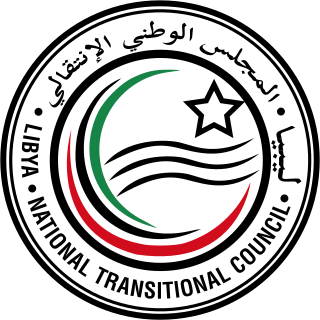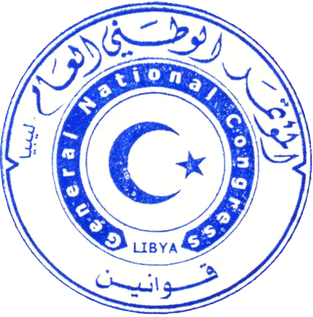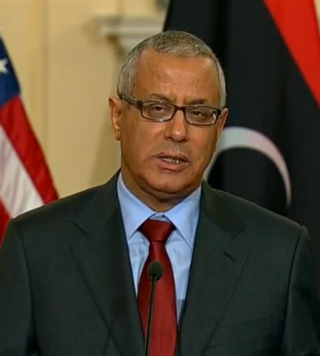Related Research Articles

Libya's history covers its rich mix of ethnic groups added to the indigenous Berbers/Amazigh people. Amazigh have been present throughout the entire history of the country. For most of its history,Libya has been subjected to varying degrees of scholar control,from Europe,Asia,and Africa. The modern history of independent Libya,as reflected in the many revolutions denoted under many moons began before Romantic time or Justinian scribing.
The media of Libya consists of a broad range of newspapers,TV channels,radio stations,and websites mostly set up during or after the Libyan Civil War,which removed previously tight restrictions on freedom of the press and freedom of speech. By the summer of 2012,there were over 200 registered newspapers,over 20 TV channels,and 200 radio stations.

Relations between Libya and the United Kingdom were initially close and positive after the British Armed Forces helped rebel forces to topple Muammar Gaddafi's regime in the 2011 Libyan Civil War. British officials have visited Libya several times since then,including two visits by Prime Minister David Cameron on which large crowds turned out to welcome him. The British Armed Forces are also helping to train Libya's National Army as part of wider cooperation on security matters. Security conditions have deteriorated since 2014,when the United Kingdom suspended operations from their embassy in Tripoli,into a second civil war. In June 2022,the United Kingdom re-opened its embassy in Tripoli.

The National Transitional Council of Libya,sometimes known as the Transitional National Council,was the de facto government of Libya for a period during and after the Libyan Civil War,in which rebel forces overthrew the Libyan Arab Jamahiriya of Muammar Gaddafi. The NTC governed Libya for a period of ten months after the end of the war,holding elections to a General National Congress on 7 July 2012,and handing power to the newly elected assembly on 8 August.

The aftermath of the First Libyan Civil War has been characterized by marked change in the social and political order of Libya after the overthrow and killing of Muammar Gaddafi in the civil war that was fought in Libya in 2011. The country has been subject to ongoing proliferation of weapons,Islamic insurgencies,sectarian violence,and lawlessness,with spillovers affecting neighboring countries including Mali.

Mustafa A. G. Abushagur is a Libyan politician,professor of electrical engineering,university president and entrepreneur. He served as interim Deputy Prime Minister of Libya from 22 November 2011 to 14 November 2012 in Abdurrahim El-Keib's cabinet and was briefly elected to succeed El-Keib as Prime Minister in 2012,before failing to receive congressional approval for his cabinet nominees and being removed from office.

Following the end of the First Libyan Civil War,which overthrew Muammar Gaddafi,there was violence involving various militias and the new state security forces. This violence has escalated into the Second Libyan Civil War (2014–2020).
The Justice and Construction Party (JCP) or Justice and Development Party is a political party in Libya associated with the Muslim Brotherhood. It was officially founded on 3 March 2012 in Tripoli.

The General National Congress or General National Council was the legislative authority of Libya for two years following the end of the First Libyan Civil War. It was elected by popular vote on 7 July 2012,and took power from the National Transitional Council on 8 August.

Ali Zeidan is a former Prime Minister of Libya. He was appointed by the General National Congress on 14 October 2012,and took office on 14 November after Congress approved his cabinet nominees. Prior to the Libyan Civil War,Zeidan was a Geneva-based human rights lawyer and according to the BBC,he is considered by some local observers as a strong-minded liberal. He was ousted by the parliament committee and fled from Libya on 14 March 2014. However,he told the press conference in Rabat,Morocco,that the ousting was invalid.

The cabinet was selected by Prime Minister Ali Zeidan on 30 October 2012 and was approved by the General National Congress on 31 October 2012 together with approving Zidan as Libya's first post-war Prime Minister. The cabinet is composed of the following ministers:Two women were selected to cabinet,and select ministries went to political independents who were not associated with any party.

Mohamed Abdelaziz is a Libyan politician who served as the foreign minister of and chairman of the Arab League council of ministers from January 2013 to August 2014.
Abdulbari Al Arusi is a Libyan engineer and politician who served as oil and gas minister of Libya from 14 November 2012 until 22 January 2014.
Salah Bashir Marghani is a Libyan jurist,and the former justice minister in the post-civil war government of Libya. He was part of Prime Minister Ali Zeidan's initial cabinet and took office on 14 November 2012.

The 2013 Benghazi conflict is a part of the aftermath of the Libyan civil war,that began after clashes erupted between protesters and militants from the Libya Shield brigade on 8 June 2013.
The 2013 Libyan coup d'état attempt was a coup d'état attempt by a group of members of the General National Congress to take control of the country from Libyan Prime Minister Ali Zeidan. Zeidan was kidnapped in the early hours of the 10 October by armed gunmen and was then released several hours later after a pro-government militia stormed the site where he was being held. Following his release Zeidan claimed the incident was an attempted coup orchestrated by two militias in line with members of the GNC opposed to Zeidan.

The Second Libyan Civil War was a multilateral civil war that lasted from 2014 to 2020 in the North African country of Libya fought between different armed groups,mainly the House of Representatives (HoR) and the Government of National Accord.
The following lists events that happened in 2014 in Libya.
Usama Siala is a Libyan politician who served as the Minister of Communications and Information Technology from January 2013 to August 2014. The cabinet was selected by Prime Minister Ali Zeidan on 30 October 2012 and was approved by the General National Congress on 31 October 2012. Siala's term as Minister of Communications and Information Technology ended when the cabinet resigned on 29 August 2014. He was then reinstated as President of General Telecommunications and Information Authority on 22/09/2014.

The Libyan presidential election had originally been planned for 10 December 2018,but was delayed due to Khalifa Haftar's Western Libya campaign. The election was thereafter scheduled to be held on 24 December 2021 but was indefinitely postponed after the head of High National Election Commission (HNEC) ordered the dissolution of the electoral committees nationwide.
References
- ↑ "Libya's Transition Could Yet be Derailed". The Manzella Report. 30 January 2013. Retrieved 17 February 2013.
- 1 2 "آلاف المسلحين الليبيين يشاركون في تدريب للالتحاق بالشرطة". Al Arabiya. 6 January 2013. Retrieved 26 October 2014.
- 1 2 "Curriculum Vitae of Ali Zeidan's government ministers". Libya Herald. 3 November 2012. Retrieved 17 February 2013.
- ↑ al Zubair, Essam (14 November 2012). "Commission dismisses 4 Libyan ministers amid anger". Arabs Today. Tripoli. Retrieved 17 February 2013.
- ↑ "Appeals court clears Interior Minister Ashour Shuwail; Integrity Commission said to be lodging own appeal". Libya Herald. Tripoli. 4 December 2012. Retrieved 17 February 2013.
- ↑ "Libyan interior minister submits resignation". Asharq Alawsat. Tripoli. Reuters. 22 May 2013. Retrieved 3 July 2013.
- 1 2 "Libyan congress approves new interior minister". Times Live. Reuters. 26 May 2013. Archived from the original on 19 May 2014. Retrieved 3 July 2013.